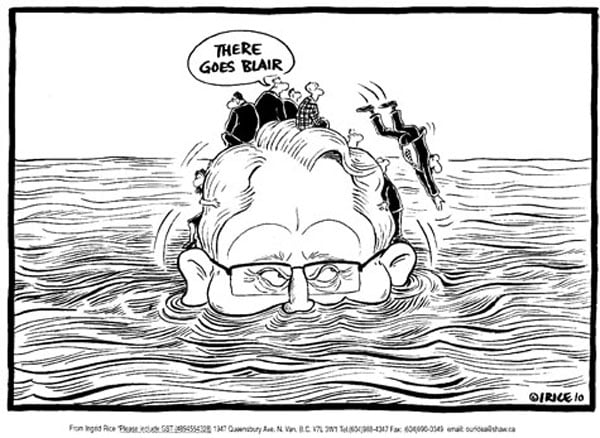"We must make some difficult choices. Do we increase income taxes, increase the provincial sales tax, or cut programs and services?" -- Ex-B.C. Liberal MLA Blair Lekstrom, after quitting over the HST
B.C. Liberal MLAs are asking you the wrong question about the 12 per cent Harmonized Sales Tax to be imposed July 1 -- because they want you to give the wrong answer.
The real question on killing the HST isn't about cutting services or raising the provincial sales tax.
The real HST question Premier Gordon Campbell fears is this: "Do you want to personally pay hundreds or even thousands of dollars in new taxes every year to subsidize big business?"
It's that simple.
And it's why the Fight HST citizens Initiative petition campaign has gathered nearly 700,000 signatures in less than 90 days -- because the answer is clear: NO!
All hell won't break loose
But Campbell wants voters to answer a very different and highly misleading question, because he wants you to give the wrong answer and begrudgingly accept the HST.
Don't be fooled.
Campbell wants you to worry that if B.C. rejects the HST and returns the $1.6 billion one-time-only grant from the federal Conservative government to "implement" the tax, all hell will break lose.
Hospital cuts, school cuts, public services slashed and taxes will have to go up, too, they want you to believe. What a disaster. We'd better keep the HST!
What garbage.
The reality is that this B.C. Liberal government is spending many times that $1.6 billion on several projects that won't even benefit most British Columbians and will be paid for over many years.
The new Port Mann Bridge alone is going to cost $3.3 billion -- double the federal HST bribe money.
The Canada Line rapid transit project cost $2 billion, the Golden Ears Bridge, $800 million, the Trade and Convention Centre, $883 million -- including a $388 million cost overrun -- and B.C. Place's new roof will run a minimum $458 million.
And then there's a little item called the Vancouver 2010 Winter Olympics -- with a price tag B.C.'s auditor general estimated at a minimum of $2.5 billion and that some critics say cost $6 billion or more.
And for non-Metro Vancouver residents -- did you happen to notice that none of the B.C. Liberals favourite big ticket items are coming to your town? But you will get to enjoy the HST every day.
A very small bribe
To put the $1.6 billion HST grant amount in perspective, it is just one per cent of British Columbia's total budget expenditures over four years – and only four per cent of one year's roughly $40 billion budget.
It's an amount that can be dealt with sensibly over the budget cycle in a number of ways without cutting needed services.
And by eliminating the HST, B.C.'s recovering economy wouldn't be hurt by the negative effects of the extra seven per cent tax on so many consumer goods and services, meaning higher government revenues are likely.
But keeping the HST means the ongoing transfer of taxes onto consumers from big business amounts to $1.9 billion each and every year -- over four years ordinary British Columbians will have to fork out an extra $7.6 billion from their own pockets in extra HST costs.
And while paying 7 per cent more for restaurant food, domestic airline tickets, haircuts, home repairs, basic cable, realtor fees and hundreds of other items, they won't get one thin dime more from the HST for new healthcare, education or public services.
Perhaps the only thing we will get is the sincere thanks of large corporations whose costs will drop by $1.9 billion.
Pass on the savings? Not likely
But if you think they will reduce prices on consumer goods you purchase by an equivalent amount to balance that, think again.
B.C. companies don't make many of the products we consume here -- so even if they did reduce their prices, it wouldn't balance the increased costs of the HST.
Think about the really large corporations who will benefit -- Alcan, Canfor or Teck Cominco, for example, and then ask yourself -- how many rolls of aluminum foil, two by fours or coal and copper will you use this year?
Even if those companies reduce their prices thanks to the HST -- a very big "if" indeed -- how will individual British Columbians possibly benefit when the products they purchase aren't made here?
The HST supporters also argue that by reducing business costs through shifting the tax burden to consumers, the overall economy will improve, jobs will be created and more money spent in B.C. -- the trickledown theory in other words.
This is about democracy
Even assuming -- again a huge risk -- that this is actually true, did you get a vote on whether or not to personally finance this enormous corporate subsidy expenditure?
Errr, no.
In fact, the B.C. Liberals in the 2009 election expressly rejected the idea they would introduce the HST when pressed by both the restaurant and home building industry associations.
And previous B.C. Liberal cabinet ministers like Carole Taylor and Rick Thorpe even warned about the negative effects an HST would have on the economy.
So remember the facts when a glad-handing premier and his MLAs make the rounds this summer trying to convince you that paying $1.9 billion every year in new HST costs for the rest of your life is worth getting $1.6 billion just once. ![]()
Read more: Politics

















Tyee Commenting Guidelines
Comments that violate guidelines risk being deleted, and violations may result in a temporary or permanent user ban. Maintain the spirit of good conversation to stay in the discussion.
*Please note The Tyee is not a forum for spreading misinformation about COVID-19, denying its existence or minimizing its risk to public health.
Do:
Do not: